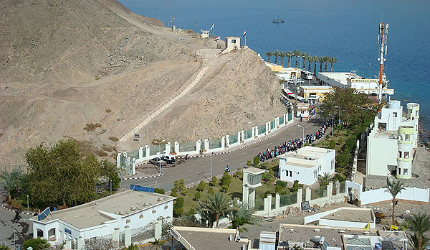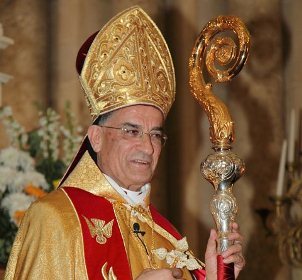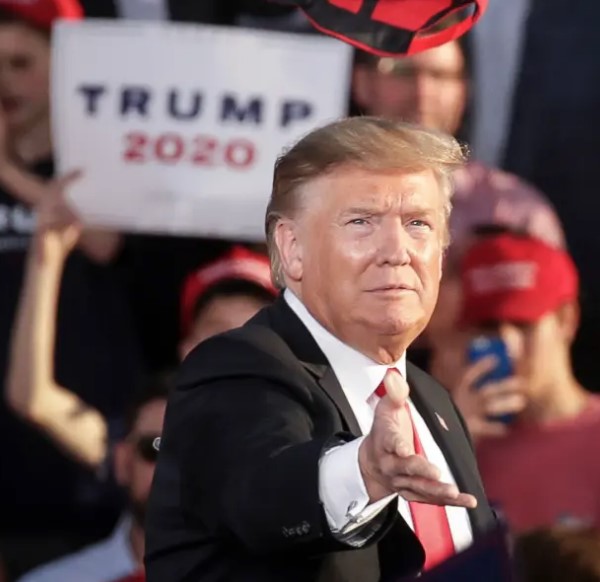By Saundra Latham, Editor at LinkedIn News — Call it Dara Khosrowshahi’s “Undercover Boss” moment. The Uber CEO told The Wall Street Journal he recently spent months as “Dave K,” ferrying passengers around San Francisco in a secondhand Tesla — an effort dubbed “Project Boomerang” at the ride-share firm. The aim? To understand the Uber […]

By Lucy Williamson & David Gritten – BBC News, in Jerusalem and London — The Israeli military has accused the Palestinian militant group Hamas of firing dozens of rockets from southern Lebanon into northern Israel. It said most of the 34 rockets were intercepted but that six hit Israeli territory, causing damage to buildings. One man was lightly wounded by shrapnel, according to medics. Hamas said it had no information about who fired the missiles. The attack was the biggest single barrage from Lebanon in 17 years. It comes at a time of rising tensions. There has been outrage in the region at the actions of the Israeli police, who have raided the al-Aqsa mosque in Jerusalem – Islam’s third holiest site – for the past two nights, triggering violent confrontations with Palestinians inside.
Palestinian militants in the Gaza Strip, which is controlled by Hamas, have also fired 25 rockets at Israel over the same period, and the Israeli military has carried out air strikes there in response. Late on Thursday, the Israel Defense Forces (IDF) said they were “currently striking in Gaza”. A number of explosions were heard in Gaza, and AFP news agency reported that multiple Hamas training sites had been hit. Earlier on Thursday, air raid sirens sounded in communities across northern Israel after rockets were launched from Lebanon while Israelis celebrated the Jewish festival of Passover. The Israeli military did not say where the six rockets that struck Israeli territory landed. But photographs showing damage to several buildings in the border town of Shlomi, including a bank, and a car in the village of Fassuta. “We heard booms, and sirens. A rocket hit the roof of a car as it was passing my house, but the rocket didn’t explode. When I went after the car, I saw someone was injured,” one eyewitness said.
A car in the village of Fassuta was damaged by one of the rockets Israel’s Magen David Adom ambulance service treated a man with shrapnel injuries, a woman who was injured while running to a shelter, and another woman who had stress symptoms. Israeli military spokesman Lt Col Richard Hecht said they believed Hamas was behind the attack and that it was possible the militant group Islamic Jihad was also involved. He added that they assumed the Lebanese militant group Hezbollah, which fought a month-long war with Israeli in 2006, knew about the attack, and that they suspected there was Iranian involvement.

By Najia Houssari – arabnews.com –– BEIRUT: A spiritual retreat on Wednesday was attended by Lebanon’s Maronite Patriarch Bechara Al-Rahi and Christian deputies in a bid to resolve a six-month stalemate over the election of a new president for the crisis-hit country. The gathering in Harissa came as separate meetings between Qatar’s Minister of State in the Ministry of Foreign Affairs Mohammed bin Abdulaziz bin Saleh Al-Khulaifi and Lebanese officials and political leaders failed to address the ongoing political vacuum. A total of 53 deputies from the Free Patriotic Movement, Lebanese Forces, Kataeb Party, and Marada Movement took part in the retreat.
Eleven deputies were absent, including FPM-backed deputy parliament speaker, Elias Bou Saab, and reformist deputies who favor political dialogue to break the deadlock. MPs Melhem Khalaf and Najat Aoun Saliba were also absent, as they entered the 77th day of their parliament protest over the issue, while MP Paula Yacoubian said she would “not participate in any activity that is based on sectarian division.” In a statement delivered to the deputies, Al-Rahi said: “The policy adopted by the ruling power erroneously is incapable of taking care of others. It grinds the poor, takes advantage of the land, faces challenges, and doesn’t know how to hold a dialogue. “What progress did you allow the people to make? What positive forces did you liberate? What did you do to elect a president?”
Hezbollah and the Amal Movement have chosen to back Suleiman Frangieh for the presidency in a move rejected by Christian MPs. The head of the Progressive Socialist Party, Walid Jumblatt, wants to elect a centrist president. Frangieh is a prominent Christian figure, backed by Hezbollah and its allies that consider the Lebanese Forces and opposition nominated MP Michel Mouawad to be a “defiant candidate.” For 11 parliamentary sessions, Hezbollah’s deputies cast blank votes and withdrew from the second rounds of voting, leading to a loss of quorum. Neither candidates will be able to become president, as both political camps are incapable of securing the 65 votes needed to win in a parliament comprising 128 deputies. Meanwhile, Al-Khulaifi reiterated Qatar’s commitment to helping Lebanon elect a president and urged officials to implement the reforms required by the international community to kickstart an economic recovery process.

By Caitlin Doornbos, Steven Nelson and Selim Algar – Nypost– PALM BEACH, Fla. — Former President Donald Trump ranted against his unprecedented arrest and arraignment Tuesday night, telling supporters at Mar-a-Lago that the real “criminal” is Manhattan District Attorney Alvin Bragg. “The only crime that I’ve committed is to fearlessly defend our nation from those who seek to destroy it,” the 76-year-old said hours after pleading not guilty to 34 felony charges of falsifying business records in connection with hush-money payments made ahead of the 2016 presidential election to two women alleging extramarital affairs with him. “The criminal is the district attorney because he illegally leaked massive amounts of grand jury information, for which he should be prosecuted — or at a minimum, he should resign,” Trump added, referring details of his indictment beihg reported ahead of his initial hearing.
“[Bragg] campaigned on the fact that he would ‘get’ President Trump — ‘I’m gonna get him, I’m gonna get him’ — this is a guy campaigning… this, before he knew anything about me,” the 45th president told hundreds of fans gathered in his Palm Beach club’s ballroom. The current front-runner for the 2024 Republican presidential nomination also slammed the “Trump-hating judge” presiding over his case, Juan Manuel Merchan, and prosecutors leading other inquiries into his conduct — but focused his ire on Bragg in his 25-minute speech. “Alvin Bragg’s wife confirmed a report that claimed her husband ‘has Trump nailed on felonies.’ She has since locked down her Twitter account,” Trump said. Bragg’s case is a legal mess — what is he even charging Trump with? Trump went on to claim that Merchan’s recent conduct in the case against longtime Trump Organization CFO Allen Weisselberg was “out of the old Soviet Union.” “The same judge told the fine man who worked for me for many, many years that if you admit your guilt, you will be in jail for 90 days. But if you don’t, if we go through a trial and you’re found guilty, you’re going away for 10 years, maybe longer,” Trump said. “They said, ‘You say anything about Trump’ — meaning that’s bad — ‘and you won’t even have to serve the 90 days — you’ll walk free’.”

by Najia Houssari — arabnews.com –– BEIRUT: Lebanese Caretaker Prime Minister Najib Mikati on Monday praised Qatar’s contributions to helping Lebanon through its political and economic crises during a meeting with the Gulf state’s Assistant Foreign Minister for Regional Affairs Mohammed bin Abdulaziz bin Saleh Al-Khulaifi. Mikati also highlighted the strong ties between the two states during talks with the visiting Qatari envoy. Mikati thanked Qatar “once again for supporting the Lebanese army and enabling it to carry out its responsibilities,” according to his media office. The Qatar official’s visit comes within the framework of the French-Arab-American endeavor to find solutions to the presidential vacuum in Lebanon, which has entered its sixth month as Parliament has held 11 failed voting sessions. Meanwhile, the Free Patriotic Movement, the Lebanese Forces, the Lebanese Kataeb, and the Progressive Socialist Party are rejecting the candidate put forward by Hezbollah and its allies, MP Suleiman Frangieh.
In talks with Al-Khulaifi, Mikati discussed the situation in Lebanon and efforts by the caretaker government to tackle emergency cases as permitted by the constitution, his media office said. He added that the solution to the crises affecting Lebanon lies in electing a president as soon as possible. Al-Khulaifi also met Parliament Speaker Nabih Berri, caretaker Foreign Minister Abdallah Bou Habib, Grand Mufti Sheikh Abdul Latif Derian, Maronite Patriarch Bechara Boutros Al-Rahi and head of the Kataeb Party MP Sami Gemayel. He later met Hussein Khalil, the political adviser to Hezbollah Secretary-General Hassan Nasrallah, in the presence of the head of Hezbollah’s Coordination and Liaison Unit, Wafiq Safa.

By Najia houssari – arabnews.com — BEIRUT: Politicians need to commit to serving love, justice, and the good of humanity, Lebanon’s Maronite Patriarch Bechara Boutros Al-Rahi said on Sunday. His appeal, which was made during a sermon, came as Christian denominations in Lebanon that follow the Western calendar celebrated Palm Sunday. Economic and political matters were topics in Al-Rahi’s message as children carried candles and olive branches and participated in processions. Al-Rahi began his sermon — after a mass held in Bkerke — by reminding believers of the many children who are denied the joy of the holiday. He said: “The purpose of the power entrusted to politicians is service, not oppression. “Those in power are not lords but servants of the common good. A true politician is a servant. “If they are not, then they are bad politicians. Politics is a noble art in service of the common good. “Politicians are thus called upon to destroy their inner tendencies to be corrupt and selfish and serve personal interests or embezzle public funds.”
Al-Rahi addressed the nation’s MPs by saying that good politicians would promptly elect a president so that order can be restored to constitutional institutions. Al-Rahi is scheduled to meet Christian MPs on Wednesday in an attempt to smooth the way for a presidential candidate to emerge who enjoys broad support among the parties. A presidential vacuum has now prevailed in Lebanon for six months and Nabih Berri, parliamentary speaker, has ended sessions to elect a president after 11 failures. Suleiman Frangieh, the head of the Marada Movement and the presidential candidate supported by Hezbollah and its allies, returned from Paris on Saturday after meeting French officials, most notably Patrick Dorrell, an adviser to the French president. Frangieh’s meetings were held as the French work to overcome obstacles impeding the presidential elections.
By Hande Atay Alam, Tamara Qiblawi and AnneClaire Stapleton, CNN — Two flight attendants claim they were sexually assaulted by then Prime Minister of Lebanon Saad Hariri aboard his private plane, according to a lawsuit filed in federal court in New York. The complaint was filed in US District Court on March 20, against Saad […]

by Hannah Frasure — intpolicydigest.org — The failure of Lebanese politicians to reform the country’s banking secrecy law perfectly highlights how corruption fuels one of the worst financial crisis in the world. Lebanon’s ongoing economic crisis is one of the worst globally since the mid-19th century, according to the World Bank. Among Lebanese households, nine out of 10 earn less than $400 per month and less than 5% of households reported any kind of financial assistance from the government, according to a survey published in December by Human Rights Watch. The current inflation rate of 171% is at its highest since 1987 — when Lebanon’s disastrous civil war was still occurring. The banking secrecy law — which plays a role in this crisis — forbids Lebanese banks from sharing details of any bank account such as its balance or owner. Under the law, anyone can “transfer assets and financial deposits to banks anonymously and in an unregulated manner,” explains Lebanese economist Hussein Cheaito. As a result, critics accuse it of enabling financial crimes like fraud and money laundering.
Michel Aoun resigned as president in late October, which has only worsened the crisis. Since then, political division between Lebanese parliamentarians has prevented them from deciding on Aoun’s successor. Without a president, the interim government has been ineffectual in terms of carrying out any reform, let alone reforming the banking secrecy law. A briefing from the International Crisis Group warned of these consequences last year. “Such a vacuum could leave the government’s hands tied, since under Lebanon’s system the president must approve any new cabinet that forms, and the outgoing incumbent has not done so. In a void, caretaker ministers will struggle to make reforms the country needs to obtain rescue from its economic woes.”

By AFP — BEIRUT: Cash-strapped Lebanon has scrapped a deal for a second terminal at Beirut’s international airport, the transport minister said Thursday, after critics raised transparency concerns in the $122 million project. Lebanon “will not proceed with the contract,” Public Works and Transportation Minister Ali Hamieh said on Twitter, adding that the decision came “following legal controversy.” Some had questioned how a caretaker government with limited powers could announce such a major infrastructure project, in a country where entrenched political barons are accused of systemic corruption.
Civil society organizations and lawmakers noted the absence of a tender process and a lack of involvement of the Public Procurement Authority. Jean Ellieh, head of the authority, said “the contract did not pass through” the regulatory body as required under a 2021 law. Last week 10 civil society groups, including Transparency International Lebanon, warned of “serious abuses” in the procurement law’s application which “open the door to corruption and nepotism.”
By Jessy Bains, Editor at LinkedIn News – A group of high-profile signatories, including Tesla CEO Elon Musk and Apple co-founder Steve Wozniak, are asking companies to pump the brakes on “giant AI experiments” until there’s confidence that any risks are manageable and the effects are largely positive. A letter published by the nonprofit Future […]



